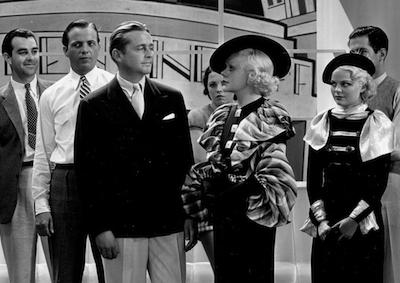Described by the New York Times as “a picturesque and exciting melodrama, loaded with convincing underworld detail and authentic criminal argot,” The Mad Game stars Spencer Tracy as notorious gangster Edward Carson, the former head of a bootlegging gang, currently serving time for income tax evasion. Prohibition ends and while Carson is locked up, his old gang, led by the double-crossing Chopper, takes up kidnapping and abducts the son and daughter-in-law of a prominent judge—the very judge who sentenced Carson to jail. Carson makes a deal with the prison warden to go undercover in order to infiltrate his former gang, find the kidnapped couple, and exact his revenge on his double-crossing friend.
Tracy and Claire Trevor, who plays a journalist and the friend and biographer of Carson, were both lauded for their acting. Tracy's performance was described as “superlatively real” in the Times, and Variety praised Trevor as “about the best portrayal of a newspaper gal which the studios have submitted.”
The Mad Game was not without its controversy, however, and the Hays office expressed concern over the theme of the film, which debuted just one year after the Lindbergh baby kidnapping. The Mad Game passed the censors on the condition that scenes of the actual abduction would be removed. On its release, the film was generally praised for its treatment of kidnapping, as it displayed the dire consequences of the crime and it described ways in which the government was acting to reduce it. —Staci Hogsett
35mm, b/w, 74 min. Director: Irving Cummings. Production: Fox Film Corporation. Distribution: Fox Film Corporation. Producer: William Fox. Screenwriters: Henry Johnson, William M. Conselman. Cinematographer: Arthur C. Miller. Music: Samuel Kaylin. Cast: Spencer Tracy, Claire Trevor, Ralph Morgan, J. Carrol Naish, Kathleen Burke.
Restored from a 35mm nitrate print and the 35mm French nitrate dupe negative. Laboratory services by YCM Labs, Audio Mechanics, DJ Audio, Inc., Pacific Title & Art Studio. Special thanks to: The Academy Film Archive, Schawn Belston, Caitlin Robertson, Victoria Stevenson.






 Mobile Navigation
Mobile Navigation

